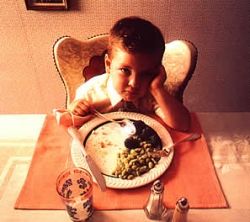How To Cure A Picky Eater

Are You Frustrated With Your Childs Picky Eating Habits
Having a child who is a picky eater can be one of the most frustrating parts of parenting.
Unfortunately, it's an all too common problem that parents have to deal with. The thing about picky eating is it makes the grownups feel awful because they've worked hard on the meal and paid for the ingredients.
It makes the grownups feel helpless because they feel their child isn't eating enough of the right foods. As for the child, they don't feel so hot about it themselves, especially if they want to eat.

How To Cure Your Picky Eater
It's all about understanding what is reall going on....
That's the kicker.
A lot of picky eating simply springs from the child not feeling hungry.
Of course, the reverse can be true as well.
Often times children will learn not to feel hungry at dinner time because that's when all the foods they don't like start coming out.
Neither scenario is good, but it gets worse.
The biggest problem is when your child is clearly hungry, announces they are hungry, but still refuses to eat what he or she is given.
Getting rid of picky eating, whatever its root, can be tricky. It takes patience, dedication and understanding from the parent, and it has to be accepted that the picky eating won't just suddenly stop. There are also many methods that have been tried by different parents, and not all of them work universally.
Because of that, any parent looking to cure picky eating in their child will have to pay attention to their child enough to know what methods will and will not work with them.
The first thing you or the parent tackling the issue is going to have to do is establish the reason behind the picky eating, as best as possible. Is it that the child isn't hungry, is it that they are simply preferring certain foods and trying to force them into every menu, or are there really a lot of foods they don't like or are afraid of trying?
The first two situations will require a strategy all their own, but for genuine picky eating you'll have to tackle it head on.
To do that, try to expose the child to the foods they won't eat in different ways. For instance, if there are meals they don't like once prepared, try serving the ingredients to them individually. If it's the ingredients, then try mixing them with foods that they do like. This isn't hard, it just requires a bit of creativity and persistence.
If you can get them to enjoy the individual ingredients, then have them help you prepare the meal so they can see what it is that's going into foods they were once afraid to try. Another approach would be to bargain a bit, and have them promise to at least take a bite of each new food they are given each time it happens. That may help them grow accustomed to them.
Remember during the process that they are just as frustrated by this whole thing as you are, and also remember that it isn't always about stubbornness or choice. They may genuinely not like a food. Your taste buds have changed a lot since you were a kid, and in your twenties you probably noticed them change again.
With that in mind, you may just have to occasionally accept the fact that the child's taste buds just won't like what they're given.

Why You Need to Cure Your Picky Eater
A lot of children are picky eaters.
They are more than happy to scarf down hamburgers, hot dogs and pizza, but they won't touch all kinds of other foods. Typically those other foods are vegetables.
Children are famous for not wanting to touch their greens and parents are famous for getting frustrated over it.
There are nightly battles over getting kids to eat everything on their plate all around the world, and few parents have an easy time getting their children past this issue.
It is important to cure a picky eater though, no matter how hard it may be. While most parents who tackle the problem do so to make their lives easier, there are more important issues at stake. Throughout a person's life, especially during their childhood, picky eating can be lead to many problems.
As a parent, you want to raise your kids to have a good and healthy life, a happy life, and so it's good and understandable that this is a big deal for so many.
The problems that kids can face throughout their childhood and later lives that stem from picky eating start with their health. Because picky eaters tend to lean towards junk food and fast food rather than fruits and other healthy choices, they are more prone to problems with weight and other related conditions. This can develop into a chronic issue throughout their lives.
A picky eater is also, more often than not, an irregular eater. They don't tend to eat three meals a day, and instead opt to eat when they are hungry and when the foods they like are available. This could mean skipping breakfast and then having an early fast food lunch, or it could mean binging in the afternoon and not having supper.
Irregular eating itself is a potential cause of obesity. That's because the digestive systems of people who eat on a fixed schedule can adapt to that schedule. When there is no schedule, a person's system can get thrown off quite quickly and they won't metabolize their food quickly enough. This same problem can result directly from the binge eating as well.
Socially speaking, there are a lot of issues that can develop with picky eaters. In fact, there's a good chance that your child, if already in school, is experiencing some of these problems already. As you know, food is a very communal thing and many social experiences center around meals.
People who are unwilling or unable to eat certain foods often find themselves shying away from certain social experiences out of fear they will be embarrassed over what they won't eat.
For these and so many other reasons, do your child a favor and help them get over their picky eating problems as soon as possible. Don't be forceful or threatening, but do your best to ease them towards the foods you feel they should be more accepting of.
If you can't do it alone, you should seek out advice from other sources, and possibly even contact your doctor as there's a chance the problems are due to an issue with their taste buds, or rooted in deeper psychological problems.

Points to Remember When Trying to Cure Your Picky Eater
You want to cure your picky eater?
Well, if you have a child under ten years of age, or so, and they are refusing to eat a lot of the foods you give them, it's likely something you've considered a lot over the last while.
How is it you can go about putting an end to their picky eating habits?
The process isn't easy, and it is a process. There is no way of just nipping this sort of thing in the bud with an overnight cure. It will instead, take ongoing work and persistence.
To help you along you can check parenting books and magazines, or even search the internet. Other parents are a good source of information as well, as many others have gone through this battle before you. With all the tips you get for helping you to cure your picky eater though, there are some things that you should keep reminding yourself, or at least consider from time to time.
One of those things is your child's hunger. It could be that they aren't really destined to be picky eaters at all, and instead just don't have an appetite come dinner time. Let's face it, cookies and chips taste a lot better than vegetables. When they get those things throughout the day they won't leave room for the better foods that come with dinner.
Why would they?
The better tasting foods are right there for them to grab, so why hold out for a vegetable?
That's why you'll need to keep an eye on their daily eating habits. It may end up being a good idea to curb their snack food intake before tackling the picky eating issue because you may find that the picky eating goes away on its own.
All that being said, putting the brakes on the junk food intake won't be such a bad thing anyway.
You also need to keep in mind that a child's taste buds aren't as developed as yours. There's a difference between a picky eater who is afraid of trying new things, or choosing to avoid foods because they are holding out for something else, and the child who simply can't tolerate a flavor.
Your child may very well have sensitive or underdeveloped taste buds, which is something they might end up growing out of. You can probably remember your taste buds changing over the years—usually adults notice this with their lower tolerance for chocolate—so remember your child may be going through a similar phase.
Something else that you should consider is your cooking. Not that you really want to think about this, but it's very possible that your cooking just isn't good. Maybe you're over spicing, or not putting on enough. Maybe you don't keep things on the stove long enough, or simply create bad combinations of foods.
It happens.
Before throwing the book at your child, consider the possibility that you may be causing their picky eating.
Either way, don't give up on your goal of getting your child to eat a wider variety of things. It will be better for you in the long run, and it will definitely be better for them. The more they eat, the more likely they will be able to form a healthy diet later in life.

Some Common Tips To Cure Your Picky Eater
Why does the problem of picky eating need a cure?
Because it really is a problem relating to health.
Long time picky eaters often grow up to have many health issues relating directly to their diets, because they aren't able to form healthy eating habits.
Worse, when they get to a point where their doctors urge them to go on an actual planned diet, they can't oblige because they are simply used to not liking the recommended foods. So you need to cure your picky eater as soon as you can, and to do it you need to follow the right advice.
Put an end to their mid-meal snacking
Stopping your children from snacking between meals can help in a few ways. For starters, you may find that the problem they've been having with the food you serve at dinner actually relates back to the fact that they just aren't hungry anymore.
True or not, stopping their snacking will at least ensure there is hunger come meal time which will give them motivation to eat what's on their plates. At the very least, you'll be able to ensure a slightly more balanced diet by getting the snack foods out of the equation.
Many parents find introducing different foods works well
When a child won't eat broccoli, introduce cauliflower. If they won't eat the cauliflower, introduce tomatoes. Basically, add variety to the evening meals so they get a chance to experience a selection of different foods and flavors. You may stumble upon healthy foods that they do like, or they simply might forget that they "don't like" certain foods and eat them the next time around.
Mix in the loved with the disliked
When you find that there are foods that they don't like, try reintroducing them into the diet by mixing them with other foods. This can work well in combination with the above method. For instance, if the child dislikes tomatoes, then start serving other foods. When you get back to serving tomatoes, serve them on a hamburger, on a pizza, or in other ways that combine them with foods you know they'll eat.
Negotiate a little bit, and things may slowly turn around
You should put the foods they don't want on their plate even if you know they won't eat it. Once it's there, start negotiating a little. Many parents find that encouraging the child to take a small bite of a disliked food every night quickly curbs their pichiness.
Don't make a huge deal about it when they start eating that food, by the way. That will just remind them that they didn't like it.
Something else you should try along with all of these other methods is promoting the foods they are about to have. Get them excited about a meal the same way you'd get them excited about dessert. Make them look forward to the foods you are going to serve so they are all psyched up to try it out.
Then if they notice a food they don't like mixed in with the meal, they'll be more willing to overlook the issue.

Creative Solutions to Cure Your Picky Eater
Having a picky eater in the family can make things difficult.
It results in a lot of arguing and negotiating on the part of the parent, and a lot of frustration on the part of the child.
As they get older things can be just as hard, with the parents having given up on curing the issue and, instead, catering to the pickiness.
If you cure the problem at its earliest stages, you can avoid a lot of grief.
There's a lot of advice floating around on how to do that, but sometimes it's the rarer, more creative suggestions that work best.
Give your child a say in the meal planning
As soon as they are old enough to communicate their desires, give your child the chance to help plan the meal. This doesn't mean you ask them what they want to eat and then cater to that. What you do is give them a variety of options.
You'll find that if they choose the things they are going to eat, they will be a lot more willing to eat it. You just have to find a good way to balance the options out so that they include things they will like along with things you are trying to get them to eat.
Let the picky eater help with the cooking
One thing that leads to picky eating is not really understanding what it is that's being served. That's one of the reasons why it's good to let your child help cook the meal. Whether it's mixing up a sauce or washing the vegetables, they'll at least know what's going in their food. Also, because the meal was partially their own creation, they are going to want to eat it.
Similarly, let them help buy the groceries
Another way to give them choice is to take them with you to the grocery store. Have them choose the vegetables they want to eat that week, or the sandwich meats, or anything else you think they need to get exposed to. As in the above cases, this will give them a sense of ownership over the foods because they were so involved with getting them on the table.
Consider changing the way you serve the meal
Serving all of the food at once is a leading cause of picky eating, and essentially is what gives a child the chance to be picky in the first place. If, however, you serve the foods they claim not to like first, they'll be faced with a dilemma. They'll either have to sit with food in front of them, watching others eat and all the while get hungrier, or they can just give in an eat what's there.
Should those things fail you, you can still find other options. Changing up the menu more frequently often helps, as does serving the food with a fun presentation.
The key is to keep trying and, while you do, give each attempt a couple of weeks to kick in. No solution will cure your picky eater instantly.
Great Stuff on Amazon
If you are having issues with you child when it comes to picky eating we would really like to here your story. Did you over come this issue or is it still ongoing, what steps you took or what did or didn't work.









